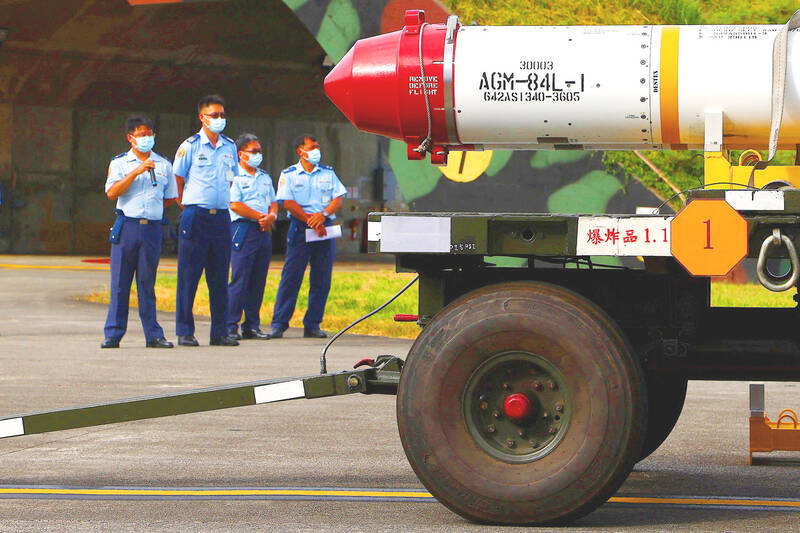About 60 percent of Taiwanese would support the government readjusting its budget so that the annual defense spending exceeds 3 percent of the nation’s GDP, a poll conducted by a Ministry of National Defense-affiliated think tank showed.
Taiwan’s national defense budget for next fiscal year is NT$606.8 billion (US$19.37 billion), a record-high, but is only 2.5 percent of GDP, the Institute for National Defense and Security Research said.
Stockholm International Peace Research Institute statistics show that Israel’s defense spending in last fiscal year was 4.5 percent of its GDP, while Washington’s was 3.5 percent of the US’ GDP, the institute added.

Photo: Ann Wang, Reuters
The institute’s questionnaire asked respondents whether they supported the government cutting other expenditures to ensure that 3 percent of GDP is spent on defense or it raising taxes to support increased defense spending.
More than half of the respondents said that the nation’s defense budget was insufficient, with 9 percent saying it was “severely insufficient” and 46 percent saying it was “insufficient,” the poll showed.
Fifty-nine percent of respondents support the government funneling other expenditures into defense to boost the defense budget to 3 percent of GDP, the poll showed.
However, support for a higher defense budget drops to 41 percent if the government funds it by increasing taxes, the poll showed.
Institute for National Defense and Security Research researcher Lee Kuan-chen (李冠成) said the institute commissioned National Chengchi University’s Pollcracy Lab to conduct an online poll from Nov. 12 to Nov. 13, receiving 1,214 valid copies.
Lee did not mention the poll’s margin of error.
In other news, a ministry report said that the planned relocation of the Armaments Bureau’s 205 Armory would not affect weapons production.
As new armory manufacturing commences, it is expected to exceed previous production quotas by several times, it added.
The armory is expected to meet its yearly production quota for the 5.56mm bullets before the production line is shut down, the ministry said, adding that the ministry is to purchase new equipment to install at the new armory site to continue production of armaments.
Integration and upgrades to existing production lines, which are expected to be completed by December 2025, would double production of essential components to 40,000 pieces annually, it said.
The same process is expected to be carried out for munition annual production of all calibers, and the output of 9mm bullets is expected to increase to 20 million rounds from 3 million, while the output of 7.62mm bullets is to increase to 32 million, from 24 million, and that of 5.56mm bullets is to rise to 40 million from 24 million, the ministry said.
New production lines for personal armament and equipment manufacturing are also to be installed, bringing annual production to 90,720 from 40,500, it said.

WANG RELEASED: A police investigation showed that an organized crime group allegedly taught their clients how to pretend to be sick during medical exams Actor Darren Wang (王大陸) and 11 others were released on bail yesterday, after being questioned for allegedly dodging compulsory military service or forging documents to help others avoid serving. Wang, 33, was catapulted into stardom for his role in the coming-of-age film Our Times (我的少女時代). Lately, he has been focusing on developing his entertainment career in China. The New Taipei District Prosecutors’ Office last month began investigating an organized crime group that is allegedly helping men dodge compulsory military service using falsified documents. Police in New Taipei City Yonghe Precinct at the end of last month arrested the main suspect,

A cat named Mikan (蜜柑) has brought in revenue of more than NT$10 million (US$305,390) for the Kaohsiung MRT last year. Mikan, born on April 4, 2020, was a stray cat before being adopted by personnel of Kaohsiung MRT’s Ciaotou Sugar Refinery Station. Mikan was named after a Japanese term for mandarin orange due to his color and because he looks like an orange when curled up. He was named “station master” of Ciaotou Sugar Refinery Station in September 2020, and has since become famous. With Kaohsiung MRT’s branding, along with the release of a set of cultural and creative products, station master Mikan

LITTORAL REGIMENTS: The US Marine Corps is transitioning to an ‘island hopping’ strategy to counterattack Beijing’s area denial strategy The US Marine Corps (USMC) has introduced new anti-drone systems to bolster air defense in the Pacific island chain amid growing Chinese military influence in the region, The Telegraph reported on Sunday. The new Marine Air Defense Integrated System (MADIS) Mk 1 is being developed to counter “the growing menace of unmanned aerial systems,” it cited the Marine Corps as saying. China has constructed a powerful defense mechanism in the Pacific Ocean west of the first island chain by deploying weapons such as rockets, submarines and anti-ship missiles — which is part of its anti-access/area denial (A2/AD) strategy against adversaries — the

RISING TOURISM: A survey showed that tourist visits increased by 35 percent last year, while newly created attractions contributed almost half of the growth Changhua County’s Lukang Old Street (鹿港老街) and its surrounding historical area clinched first place among Taiwan’s most successful tourist attractions last year, while no location in eastern Taiwan achieved a spot in the top 20 list, the Tourism Administration said. The listing was created by the Tourism Administration’s Forward-looking Tourism Policy Research office. Last year, the Lukang Old Street and its surrounding area had 17.3 million visitors, more than the 16 million visitors for the Wenhua Road Night Market (文化路夜市) in Chiayi City and 14.5 million visitors at Tainan’s Anping (安平) historical area, it said. The Taipei 101 skyscraper and its environs —